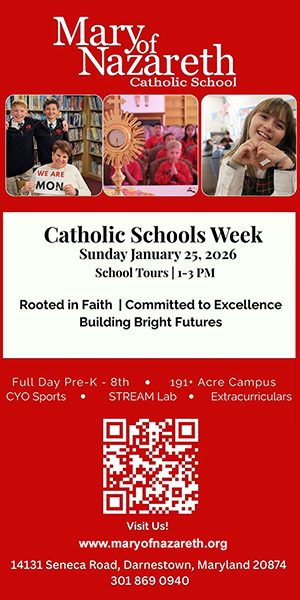Pope Leo XIV urged U.S. high school students to be “intentional” with their screen time, their prayer time and their involvement in a local parish.
“One of my own personal heroes, one of my favorite saints, is St. Augustine of Hippo,” the pope told 16,000 young Catholics meeting in Indianapolis. “He searched everywhere for happiness, but nothing satisfied him until he opened his heart to God. That is why he wrote, ‘You have made us for yourself, O Lord, and our heart is restless until it rests in you.”
With a livestream connection, Pope Leo spoke for close to an hour Nov. 21 with participants at the National Catholic Youth Conference meeting at Lucas Oil Stadium in Indianapolis.
The pope responded to questions from five high school students: Mia Smothers from the Archdiocese of Baltimore; Ezequiel Ponce from the Archdiocese of Los Angeles; Christopher Pantelakis from the Archdiocese of Las Vegas; Micah Alcisto from the Diocese of Honolulu; and Elise Wing from the Archdiocese of Dubuque, Iowa.
The questions were developed in meetings with other students and adults and were sent to the pope in advance.
Pope Leo did respond to a question and comment posed by Katie Prejean McGrady, who was moderating the event. She mentioned that she had given the pope a pair of socks some time ago and said she wanted to know what he used as an opening word when he played Wordle each day.
“I just want to say I only wear white socks, and I use a different word for Wordle every day, so there’s no set starting word,” the pope said, before turning to the young people’s questions.
Pantelakis asked for the pope’s advice on balancing the use of smartphones and social media with “making faith connections outside of technology.”
Pope Leo, using technology to address the students, listed many good things technology does. For example, “it lets us stay connected with people who are far away,” he said, and there are “amazing tools for prayer, for reading the Bible, for learning more about what we believe, and it allows us to share the Gospel with people we may never meet in person.”
“But even with all that, technology can never replace real, in-person relationships; simple things (like) a hug, a handshake, a smile – all those things are essential to being human and to have those things in a real way, not through a screen,” is important.
Pope Leo encouraged the students to follow the example of St. Carlo Acutis, who used technology to spread devotion to the Eucharistic but limited his time online and made sure he went to Mass, spent time in Eucharistic adoration and served the poor.
“Be intentional with your screen time,” the pope told the young people. “Make sure technology serves your life and not the other way around.”
Alciso asked for advice about using ChatGPT and other forms of artificial intelligence.
While Pope Leo has continued to push AI developers and governments to formulate ethical guidelines and include controls to protect young people, he told the high school students that “safety is not only about rules; it is about education, and it is about personal responsibility. Filters and guidelines can help you, but they cannot make choices for you; only you can do that.”
“Using AI responsibly means using it in ways that help you grow, never in ways that distract you from your dignity or your call to holiness,” the pope said. “AI can process information quickly, but it cannot replace human intelligence – and don’t ask it to do your homework for you.”
AI, he said, “will not judge between what is truly right and wrong. And it won’t stand in wonder, in authentic wonder, before the beauty, the beauty of God’s creation. So be prudent. Be wise. Be careful that your use of AI does not limit your true human growth.”
“Use it in such a way that if it disappeared tomorrow, you would still know how to think how to create, how to act on your own, how to form authentic friendships,” the pope said. And “remember, AI can never replace the unique gift that you are to the world.”
Responding to Wing, who asked about the future of the Church, Pope Leo told the young people they are an important part of its present. “Your voices, your ideas, your faith matter right now, and the Church needs you,” he said.
But, looking ahead, he asked them to ask themselves: “What can I offer the Church for the future? How can I help others come to know Christ? How can I build peace and friendship around me?”
Smothers asked the pope if he ever finds it difficult to accept God’s mercy.
“All of us struggle with this at times,” the pope said. “The truth is that none of us is perfect.”
But, he added, it also is true that God always forgives.
“We may struggle to forgive, but God’s heart is different,” Pope Leo told the teens. “God never stops inviting us back. We experience this mercy of God in a special way in the sacrament of reconciliation; in confession, Jesus meets us through the priest. When we honestly confess our sins and accept our penance, the priest gives absolution, and we know with certainty that we are forgiven.”
“Do not focus only on your sins. Look to Jesus, trust his mercy and go to him with confidence; he will always welcome you home,” the pope said to applause.












